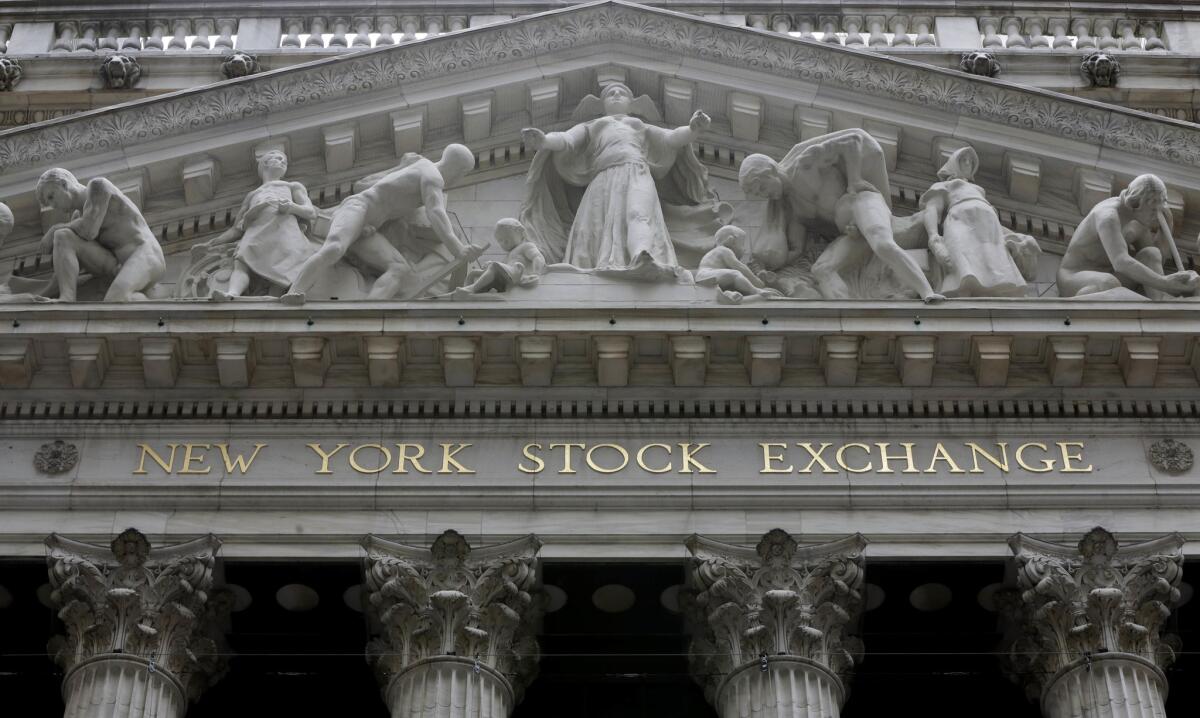Stocks slip, pulled down by healthcare and industrial firms

- Share via
Losses for healthcare companies and banks left U.S. stocks lower Monday after a quiet day of trading. Industrial conglomerate General Electric skidded after announcing more changes in its leadership.
Companies that distribute or sell prescription drugs continued to slide after speculation that Amazon plans to get into that business, something Amazon has not confirmed.
Banks slipped after a big rally over the last month, and technology companies continued to climb. Smaller, more domestically focused companies declined as investors tried to gauge the odds of tax cuts.
Stocks have rallied in the last two weeks as investors hope tax cuts proposed by the Trump administration and congressional Republicans will boost corporate profits. But over the weekend, President Trump entered a war of words with Sen. Bob Corker, a Tennessee Republican who has a reputation as a budget hawk. Republicans have a narrow majority, and losing just a few votes could derail a bill.
“There really is not much leeway there,” said Mona Mahajan, U.S. investment strategist for Allianz Global Investors. “They somehow have to get their act together.”
The Standard & Poor’s 500 index fell 4.60 points, or 0.2%, to 2,544.73. The Dow Jones industrial average edged down 12.60 points, or less than 0.1%, to 22,761.07. The Nasdaq composite fell 10.45 points, or 0.2%, to 6,579.73, which ended a nine-day winning streak. The Russell 2000 index of smaller-company stocks fell 6.66 points, or 0.4%, to 1,503.56.
Stock trading was light because of the U.S.’ Columbus Day holiday. Bond trading was closed.
General Electric fell 3.9% to $23.43 after it named Ed Garden of Trian Fund Management to its board of directors. Trian, an activist investment firm founded by Nelson Peltz, has been pushing the conglomerate to slim down. GE shares have fallen 26% this year.
GE has announced slew of changes in its leadership this month. John Flannery replaced Jeffrey Immelt as chief executive a week ago, several months ahead of the schedule the company announced in June. On Friday, GE said Chief Financial Officer Jeffrey Bornstein will leave at the end of the month. Two vice chairs are also retiring.
Healthcare companies did worse than the rest of the market. Companies that distribute or sell prescription medicines or administer prescription drug benefits tumbled for a second day as investors continued to worry that Amazon might enter the prescription drug business. Analysts raised that possibility Friday. Amazon has declined to comment.
Pharmacy benefits manager Express Scripts slid 5% to $59.22. Prescription drug distributor McKesson fell 2.1% to $148.14. Walgreens retreated 3.2% to $70.87, its lowest close in more than a year and a half.
Medical device maker Medtronic fell 3.6% to $76.93. The company said late Friday that Hurricane Maria will reduce its quarterly profit and revenue by about $250 million. Medtronic has four facilities in Puerto Rico that were damaged by the storm, and manufacturing won’t fully recover for weeks.
Tesla fell 3.9% to $342.94 after the Wall Street Journal reported on the electric car maker’s struggles in producing its new, lower-priced Model 3 sedan. The Journal reported Friday that Tesla workers were making some Model 3 parts by hand as recently as September. Last week Tesla missed its third-quarter production goals.
Third-quarter earnings reports will start later this week, when major banks begin announcing their results. Investors expect continued strong results from the technology industry, which has led the market higher for most of this year. Shares of chipmaker Nvidia advanced 2.3% to $185.39 on Monday, and cloud computing company Citrix Systems rose 1.4% to $80.62.
Three major hurricanes hit the U.S. in the last two months, and experts expect that to affect economic growth and corporate profits.
“One of the sectors that we think is going to get hit is the insurance sector because they’re going to be paying out all these claims,” Mahajan said. She said the storms will reduce third-quarter economic growth by 0.4%. Historically, the economy bounces back from major storms quickly as people rebuild damaged areas.
Benchmark U.S. crude rose 29 cents to $49.58 a barrel as Tropical Storm Nate moved away from the Gulf Coast, where much of U.S. crude is drilled and processed. Brent crude, used to price international oils, rose 17 cents to $55.79 a barrel.
Wholesale gasoline stayed at $1.56 a gallon. Heating oil fell 1 cent to $1.74 a gallon. Natural gas fell 3 cents to $2.83 per 1,000 cubic feet.
Gold rose $10.10 to $1,285 an ounce. Silver climbed 18 cents, or 1.1%, to $16.97 an ounce. Copper remained at $3.03 a pound.
The dollar slipped to 112.69 yen from 112.71 yen. The euro rose to $1.1752 from $1.1735.
In overseas markets, the DAX in Germany rose 0.2%, the CAC 40 of France edged up 0.1%, and the British FTSE 100 fell 0.2%. Hong Kong’s Hang Seng fell 0.5%. Markets in Japan and South Korea were closed for holidays.
UPDATES:
3:15 p.m.: This article was updated with closing prices, context and analyst comment.
This article was originally published at 6:55 a.m.
More to Read
Inside the business of entertainment
The Wide Shot brings you news, analysis and insights on everything from streaming wars to production — and what it all means for the future.
You may occasionally receive promotional content from the Los Angeles Times.










